Roll for initiative...in group therapy
Dungeons & Dragons is great for community, imagination, and now, group therapy.
In a typical Dungeons & Dragons group, the Dungeon Master fulfills a variety of roles: storyteller, improv actor, rules keeper, content moderator, and from time to time, therapist. Now that role is becoming more official.
Using D&D as a group therapeutic tool is a concept that’s relatively novel, but some psychologists see it as a medium that can help patients develop beneficial skills and relationships. “It’s a new frontier of doing group therapy,” says Dr. William Nation, staff psychologist at the Johns Hopkins University counseling center and facilitator of D&D therapy group (Social) Skills Quest. “The more people who engage with it the better and more powerful it gets.”
Nation first began experimenting with D&D groups in private practice in 2019, but these types of groups gained popularity in the wake of the pandemic. “On the one hand [the pandemic] made some of it harder because you’re not around a table and you’re losing some of the spaces you had before.
“But on the other hand, there was a lot of demand for services and a lot of demand for recreation,” Nation says. “In the mental health community especially, there was a willingness to take some chances; there are a lot of places that wouldn’t have done insurance payoffs for remote therapy pre-pandemic, and that changed everything.” At Johns Hopkins, Nation says (Social) Skills Quest was an “easy sell” for remote students looking to connect with other people in the absence of in-person classes.
According to Nation, tabletop role-playing game (TTRPG) therapy can help with managing depression, combating social anxiety and isolation, making friends and sustaining relationships, and even processing trauma.
“People can express and explore trauma-related stuff in a way that feels safe because they’re doing it as a character not themselves,” Nation says. One such example, Nation recalls, is a player who decided to make a character who was a Druid but had formerly been a Cleric whose god had died. This allowed the player to voice and examine their own traumatic experience with religion through the lens of a religious structure that doesn’t directly mirror anything in the real world.
The clearly defined ruleset of D&D 5th Edition also makes this style of therapy beneficial for the autistic population. Systems like granting Advantage and Disadvantage on rolls for characters in social situations can help clients to understand social cues in a way that may be difficult for them in a less-structured environment. “I’m not trying to punish them with the rules of the game,” says Nation, “but that’s sometimes a thing that’s easier to understand.”
Typically, a (Social) Skills Quest campaign runs the length of an academic semester and is broken into four “acts,” with each therapy session constituting one “episode.” To begin the campaign, Nation says the group has a strong session 0, during which ground rules and expectations for the rest of the experience are set. Certain rules carry over from group to group (no real-world politics or religion, nothing grimdark, no abusive behavior), but the group is also given freedom to set up their own boundaries, or not. If a group’s ground rules are loose, that can shape the way conversations go throughout the rest of the semester. Also, to keep the group on track, there’s always a second group facilitator playing a character to keep the group from straying too far afield.
When it comes to creating characters, Nation allows for a large degree of freedom. “I don’t put a lot of limitations on things because I want to see what they do,” he says. However, Nation adds, “I tend to believe that when you give humans the ability to create a character, they create themselves but with some tweaks, and that generally holds true within the group.”
If a player chooses a character archetype with social skills coded in, like a rowdy Barbarian, Nation tweaks the game system somewhat to allow for their class stats and features to translate to a more social setting. In general, the version of D&D used in (Social) Skills Quest is a heavily modified one that prioritizes character interactions over combat, though combat does still factor in.
After the comprehensive initial setup, when everyone has built a character, sessions play out like fairly normal TTRPG meetups with a conversational “decompression phase” added at the end. After playing for 1 to 1 1/2 hours, the remainder of the two-hour session transitions to a more standard group therapy format. Players discuss what happened in the game, how it made them feel, and what they might like to try to do differently. As the groups continue to play together and learn more about each other as people, “the processing part comes more naturally,” says Nation, with players beginning to check in with each other and ask questions more often during the gameplay phase instead of waiting for the discussion portion of the session.
Anecdotally, Nation says that the participants in his groups have all shown improvement in their symptoms. And it’s not just the formal therapy aspect of the groups that helps. Even a regular TTRPG meetup can have a notable positive impact, as long as it’s done in a safe and collaborative way. “A lot of the stuff that’s therapeutic about it is just stuff that’s inherent to being in a gaming group with people,” says Nation. “It’s just that I happen to be a therapist and cater our games more specifically to people.”
Think about that the next time you feel you're in need of a Charisma saving throw.




